
Rust is a common cause of staining on outdoor pavers and marks can be difficult to remove – especially if you don’t know the origin of the stain. Although rust generally always creates an orange-coloured stain on the face of a paver, there are actually two different types: surface stains caused by external objects/deposits and naturally-occurring stains. Once you’ve established the root of the problem – and are armed with the correct treatment – removal can be swift and effective.
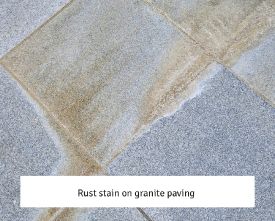
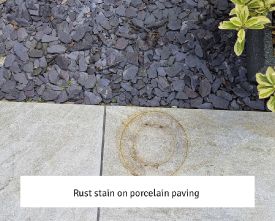
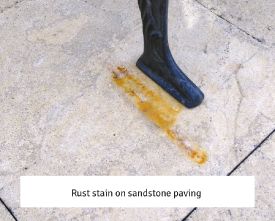
Surface rust stains
Most rust stains are caused by metal objects. Outdoors, common culprits include rusting BBQs, metal umbrella stands, pots and garden tools. Tiny deposits of iron wash off the surface of the objects when they come into contact with moisture and these deposits then leave a rust stain. They’re generally easy to identify because the stain often mirrors the exact shape of the rusting metal object that was sitting on the surface.
In addition, some weed killers and lawn fertilisers can create rust stains, caused by ferric sulphate iron particles within them. These stains appear as little spots of rust.
Naturally-occurring rust stains
Rust or orange-coloured discolouration can appear naturally within hard ferrous-type stone pavers; this is especially common in sandstone. These stones naturally contain iron which can oxidise or rust when it comes into contact with rain. Stains often appear after laying and are easy to identify because the appearance is normally a gradual phasing in that results in a bloom of orange colour across the surface of the stone.
The stain removal solutions
Jet washing, scrubbing with soapy water and treatment with harsh chemicals like brick acid won’t remove these stains – but the right chemical will.
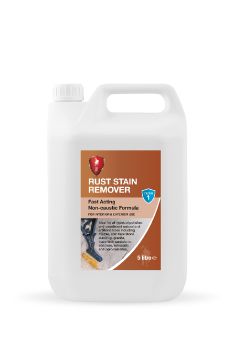
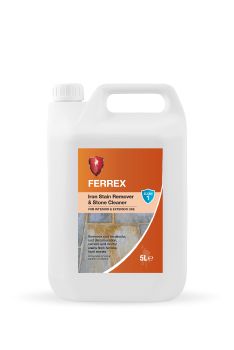
Surface rust stains:
For these stains, we recommend LTP Rust Stain Remover– a non-caustic solution that’s safe to use on all types of polished and unpolished natural and artificial stone tiles, including marble, granite, travertine, split face stone cladding, sandstone, concrete, terracotta, ceramic and porcelain.
How to apply LTP Rust Stain Remover:
- Ensure that the surface to be treated is completely free from dust and dirt before application. If necessary, wash with LTP Grimex diluted 1:10 with water.
- SHAKE WELL BEFORE USE. Do not dilute. Completely cover the rust stain with the product. Leave to act for 15 minutes. The product colour will change to a deep purple as it reacts with the rust. Once the indicated time has elapsed, remove the residue and rinse the surface thoroughly with plenty of water and leave to dry. Repeat application until the stain is completely removed.
Naturally-occurring rust stains:
For these stains, we recommend LTP Ferrex – an acid-based cleaner but the right kind of acid for harder stones! Ferrex is designed for hard ferrous stones including sandstone, granite and slate. However, it isn’t suitable for use on acid sensitive surfaces, like limestone, marble or pavers with a highly polished finish.
How to apply LTP Ferrex:
- After testing on a small area, apply the solution to the surface and spread out evenly. For external applications, garden sprayers can be used.
- For severe staining, surfaces should be agitated using a short haired scrubbing brush or black emulsifying pad.
- After 3 – 6 hours, rinse with plenty of clean water. If traces remain after a couple of days, repeat the process.
- After treatment, we recommend that the surface is protected from water with an impregnating sealer like LTP External Stone Sealer or LTP Mattstone H20. This will greatly reduce the risk of rust discolouration returning.
Some natural stones will appear darker after treatment, as the product continues to work following the initial application. This is normal and the darkening effect will gradually subside.
For more advice and demos, browse LTP TV on YouTube or contact the LTP team direct on tel. 01823 666213 or email [email protected]



